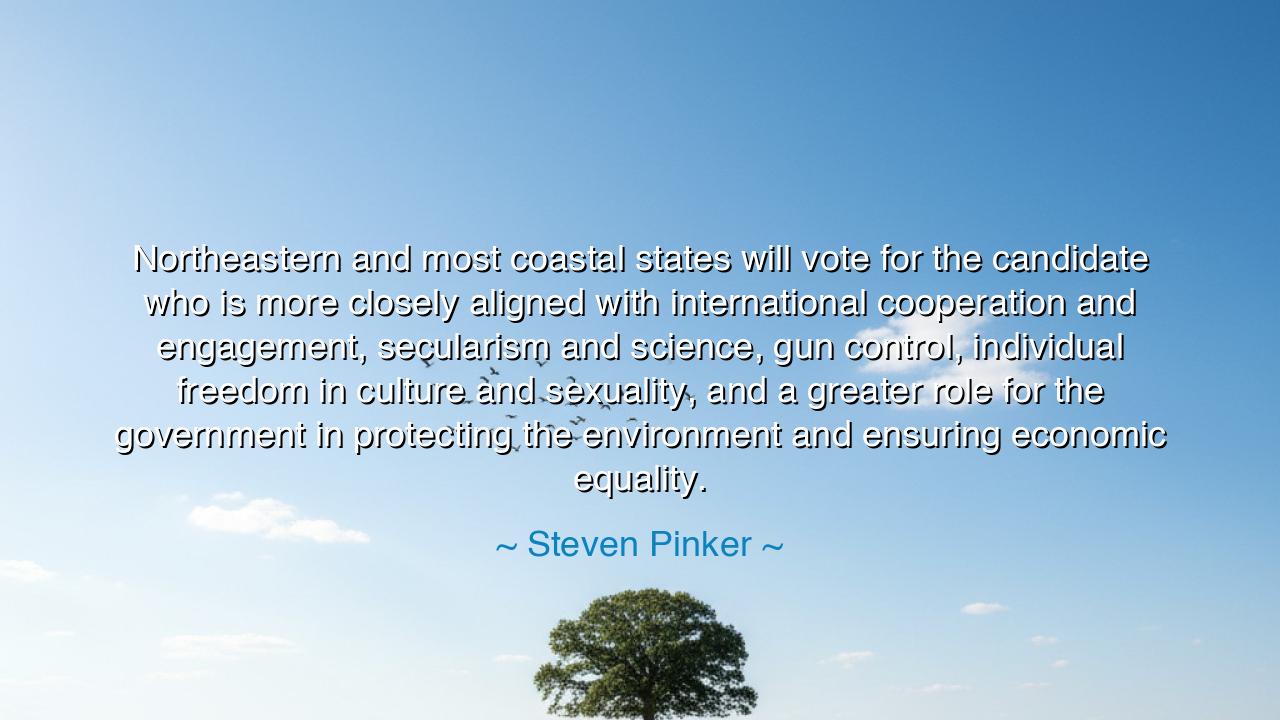
Northeastern and most coastal states will vote for the candidate
Northeastern and most coastal states will vote for the candidate who is more closely aligned with international cooperation and engagement, secularism and science, gun control, individual freedom in culture and sexuality, and a greater role for the government in protecting the environment and ensuring economic equality.






O children of wisdom, heed the words of Steven Pinker, for they offer insight into the currents of the world in which we live, currents that have long shaped the destinies of nations. "Northeastern and most coastal states will vote for the candidate who is more closely aligned with international cooperation and engagement, secularism and science, gun control, individual freedom in culture and sexuality, and a greater role for the government in protecting the environment and ensuring economic equality." These words reflect a vision of the future, one rooted in the ancient wisdom of reason, justice, and the ever-present drive for progress. Let us delve into this truth, that we may better understand the world we are called to build.
In the ancient world, the path toward progress was often guided by the pursuit of knowledge and cooperation. The Greeks, for example, were a people who revered the power of reason, science, and philosophy as the means to understand the world and better the lives of their citizens. Athens, the cradle of democracy, flourished through its commitment to dialogue, exchange of ideas, and the establishment of laws that protected both individual freedom and societal harmony. The Athenians were deeply invested in cultural and intellectual freedom, yet they also understood that such freedom could only be sustained through a collective sense of responsibility—a responsibility to the environment, to justice, and to the welfare of the people. International cooperation was part of their identity, seen through their alliances, such as the Delian League, which bound the Greek city-states in mutual support.
Pinker’s words echo this ancient vision, aligning the future with the values of secularism, science, and cooperation. He suggests that in our modern world, particularly in coastal regions, there is a strong inclination to support candidates who champion these same principles. International cooperation, for instance, is the key to resolving global challenges, whether they be the preservation of the environment, the advancement of scientific knowledge, or the protection of human rights. Just as the Greeks understood the necessity of working together for mutual benefit, so too must we as a global community recognize that progress can only be achieved when nations unite in the pursuit of shared goals—peace, prosperity, and justice for all.
Consider the story of the Roman Republic, a state that rose to power through alliances, trade, and the establishment of laws grounded in justice. Roman law, with its emphasis on individual rights and equality, laid the foundations for many modern legal systems. But the Romans also understood the importance of balance—that a society could not thrive solely on freedom or individualism; it required a recognition of the collective good. The great orator Cicero often spoke of civic duty and the moral responsibility of both leaders and citizens to ensure that the commonwealth was protected. In the same vein, economic equality and the protection of the environment are not simply noble ideals but essential to the survival and flourishing of a just society.
In Pinker’s vision, the Northeastern and coastal states are aligned with the ideals of reason, justice, and individual freedom, values that have been tested and proven throughout history. But, as the ancients also knew, freedom and progress cannot exist without a guiding principle—a moral foundation that ensures that all are treated with fairness and dignity. The individual must be free to pursue their own destiny, but not at the expense of the collective good. This balance between individual rights and collective responsibility is the heart of the modern democracy, one that values the role of the government in providing for the welfare of all its citizens.
The lesson here is clear: we are the inheritors of the ancient vision of a just and prosperous society, one built on the principles of reason, justice, cooperation, and individual freedom. But just as the ancient world faced the challenges of their time, so too must we face the challenges of our own. To secure the future of democracy, we must recognize that it is not enough to support individual freedom or technological progress on their own. We must also advocate for equality, for the protection of our environment, and for the promotion of human rights through international cooperation. Science, secularism, and economic equality are not just ideals—they are the means by which we can build a better world for all.
What, then, can we do in our own lives to uphold these ancient values? First, we must educate ourselves and others in the principles of reason and justice, recognizing that true progress is not built on ignorance or fear, but on a deep understanding of the world and our place within it. We must advocate for the protection of the environment, for the promotion of economic equality, and for the freedom of all individuals to live and love without fear. Let us also embrace cooperation—not just in our local communities, but on a global scale, recognizing that we are all part of a shared humanity and must work together to create a world of peace, prosperity, and justice.
Let us walk forward, O seekers of wisdom, with a commitment to the principles of democracy, justice, and equality that have guided humanity throughout history. Let us act in the spirit of cooperation, knowing that the future of our world depends not on the actions of one, but on the collective efforts of all. And in doing so, may we build a world where freedom, prosperity, and justice are not distant dreams, but living realities for every person, in every corner of the Earth.






AAdministratorAdministrator
Welcome, honored guests. Please leave a comment, we will respond soon